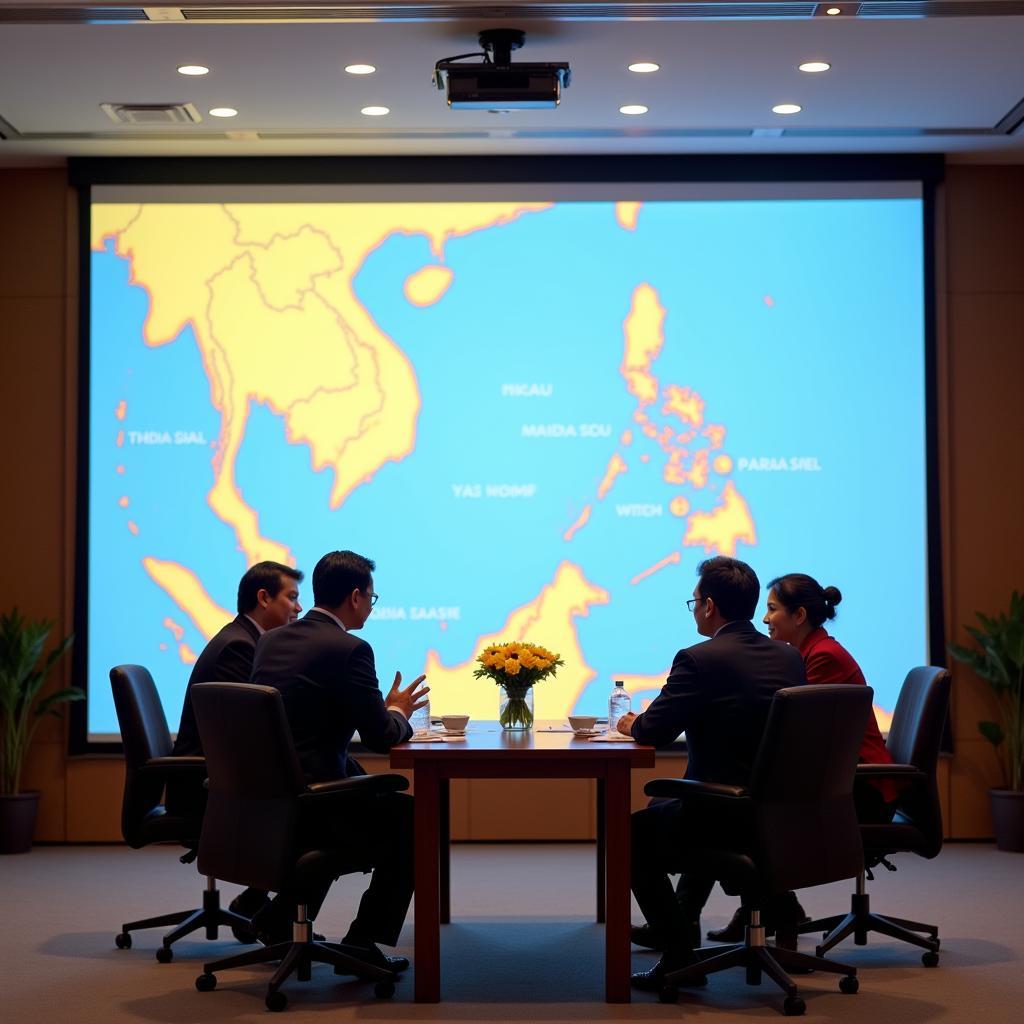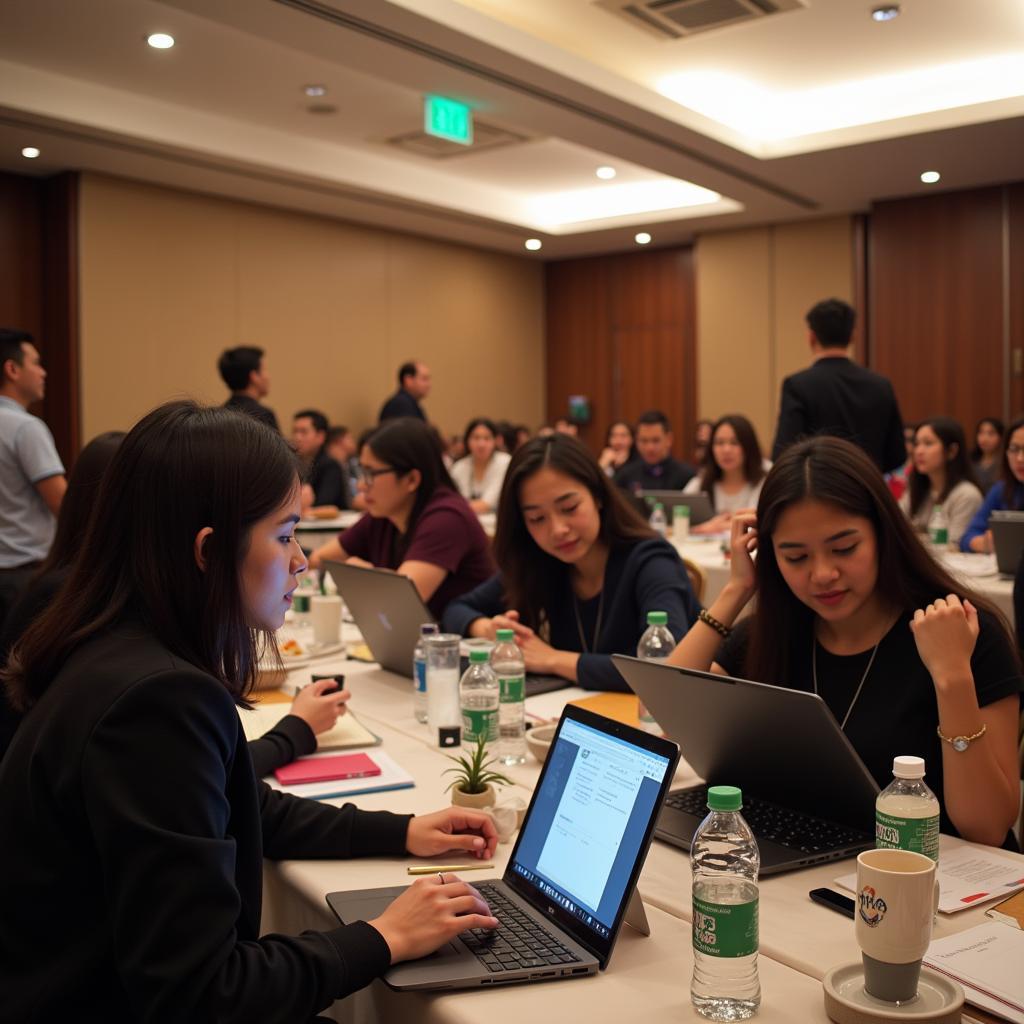The Arf Asean South China Sea issue represents a significant geopolitical challenge, impacting regional stability and international relations. This article delves into the complexities of the situation, examining ASEAN’s role, the ARF’s contributions, and the various perspectives involved. We will explore how these actors navigate the delicate balance between cooperation and competition in this vital maritime area. Just after the 51st ASEAN Foreign Ministers’ Meeting, the importance of this issue has been reaffirmed.
ASEAN’s Role in the South China Sea Dispute
ASEAN plays a crucial role in managing the South China Sea disputes. Its member states are directly impacted by the territorial claims and resource competition. ASEAN seeks to promote peaceful resolutions through dialogue and cooperation, emphasizing adherence to international law, particularly the United Nations Convention on the Law of the Sea (UNCLOS). The organization’s approach involves facilitating negotiations between claimant states, fostering confidence-building measures, and developing a Code of Conduct in the South China Sea. These efforts aim to prevent escalation and maintain regional stability. The ASEAN Regional Forum (ARF) also offers a platform for dialogue on the issue. For more context on ASEAN’s relationship with other organizations, see ASEAN and other organizations.
 ARF ASEAN South China Sea Dialogue
ARF ASEAN South China Sea Dialogue
Balancing National Interests and Regional Cooperation
ASEAN member states face the challenge of balancing their national interests with the need for regional cooperation. Some states have overlapping claims in the South China Sea, leading to tensions and potential conflicts. However, they also recognize the importance of maintaining a united front within ASEAN to effectively address the issue and engage with external powers. This requires delicate diplomacy and a commitment to finding common ground. You can learn more about the ARF’s specific role at ARF ASEAN Regional Forum.
The ARF and the South China Sea: A Platform for Dialogue
The ARF serves as a crucial platform for dialogue and confidence-building among regional and extra-regional powers involved in the South China Sea issue. It brings together ASEAN member states, China, the United States, and other key players to discuss maritime security, freedom of navigation, and peaceful dispute settlement. The ARF provides an opportunity for these diverse actors to exchange views, share information, and explore potential solutions. It also fosters a sense of shared responsibility for maintaining regional stability.
Promoting Confidence-Building Measures
The ARF promotes confidence-building measures to reduce tensions and prevent incidents in the South China Sea. These measures include promoting military transparency, establishing communication channels between navies, and conducting joint exercises. By enhancing mutual understanding and reducing the risk of miscalculation, the ARF contributes to a more stable and predictable maritime environment. For information about a specific ASEAN foreign ministers meeting, visit the 51st ASEAN Foreign Ministers’ Meeting and Related Meetings.
The Challenges of Multilateralism in the ARF ASEAN South China Sea Issue
Despite the ARF’s efforts, the South China Sea issue remains a complex and challenging one. The diverse interests and perspectives of the involved parties make it difficult to reach consensus on key issues. Some countries prioritize their sovereignty claims and resource access, while others emphasize freedom of navigation and international law. This divergence of views often hinders progress towards a comprehensive and lasting solution. The evolving geopolitical landscape, including shifting power dynamics and increasing militarization, further complicates the situation. For further reading, you might want to explore ASEAN 2017 Theme.
Navigating the Future of the South China Sea
Dr. Anisa Dewi, a prominent Southeast Asian political analyst, notes, “The South China Sea is a microcosm of the larger geopolitical challenges facing the region. Effective management requires a delicate balance of diplomacy, cooperation, and a commitment to international law.”
Another expert, Professor Michael Nguyen, specializing in maritime security, adds, “Building trust and fostering open communication are essential for mitigating risks and preventing escalation in the South China Sea. The ARF has a vital role to play in this process.”
Conclusion
The ARF ASEAN South China Sea issue demands continued attention and collaborative efforts from all stakeholders. ASEAN’s role in facilitating dialogue and promoting cooperation is crucial for maintaining regional stability. The ARF provides a vital platform for engaging regional and extra-regional powers in addressing this complex challenge. While significant obstacles remain, a commitment to multilateralism, adherence to international law, and sustained dialogue offer the best hope for a peaceful and prosperous future in the South China Sea.
FAQ
- What is the ARF’s role in the South China Sea? (The ARF serves as a platform for dialogue and confidence-building among the countries involved in the South China Sea dispute.)
- How does ASEAN contribute to resolving the South China Sea issue? (ASEAN promotes peaceful resolutions through dialogue, cooperation, and adherence to international law.)
- What are the main challenges in addressing the South China Sea dispute? (The main challenges include overlapping territorial claims, resource competition, and differing interpretations of international law.)
- Why is the South China Sea important? (The South China Sea is strategically important for its vital shipping lanes, rich fishing grounds, and potential oil and gas reserves.)
- What is the Code of Conduct in the South China Sea? (The Code of Conduct is a set of rules being negotiated by ASEAN and China to manage maritime activities and prevent conflicts in the South China Sea.)
- How does the South China Sea dispute affect regional stability? (The dispute raises tensions among countries, increases the risk of military incidents, and can hinder economic cooperation.)
- What are some potential solutions to the South China Sea issue? (Potential solutions include joint development of resources, establishing maritime boundaries based on international law, and strengthening regional security mechanisms.)
Need support? Contact us 24/7: Phone: 0369020373, Email: [email protected], or visit us at Ngoc Lien Village, Hiep Hoa, Bac Giang, Vietnam.

